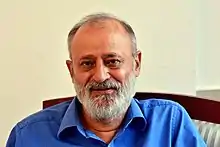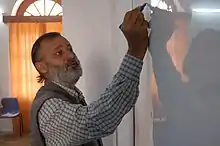Gauhar Raza
Gauhar Raza (born 17 August 1956) is an Indian scientist by profession, and a leading Urdu poet, social activist and documentary filmmaker working to popularize the understanding of science among general public, known for his films like Jung-e-Azadi, on the India's First War of Independence, and Inqilab (2008) on Bhagat Singh.[1][2][3] He was also the honorary director of Jahangirabad Media Institute.
Gauhar Raza | |
|---|---|
 | |
| Born | 17 August 1956 |
| Occupation(s) | poet, activist, scientist, documentary filmmaker |
| Spouse | Shabnam Hashmi |
Early life and education
Born in Allahabad, Uttar Pradesh, India on 17 August 1956. His family shifted to Aligarh in 1958. His father Wizarat Husain (1919 = 2007) was a freedom fighter, a communist party member and a renowned educationist and science teacher in Aligarh Muslim University, Aligarh. His mother, a social worker, was also intensely involved in freedom struggle and had worked with Indira Gandhi in Allahabad.
He completed a BSc in Engineering from Aligarh Muslim University (AMU), in 1977 and MTech in Power Apparatus and Systems from Indian Institute of Technology, Delhi in 1979. He was a member of Students' Federation of India when he studied in AMU. During the Emergency, he was the SFI Secretary of Western Uttar Pradesh.
Career
In 1979 he joined Eicher Goodearth Ltd., a multinational company as an electrical engineer and worked there for 3 years. Solved a few major design problems that the company was facing and within a short span of time he rose to Executive-Engineer level. In 1982 he joined the National Institute of Science, Technology and Development Studies as a scientist and still to work continues there.

Poetry
Gauhar Raza's poetry collection Jazbon Ki Lau Tez Karon has been noticed for the frankness of tone and for the social concerns that they take up and treat sensitively. In his most famous poem "Main Chahta hoon"(I like to), he express his helplessness to write a romantic poem in the days of darkness.[4] He also wrote lyrics for a Hindi film Say Salaam India released in 2007.[5][6]
Personal life
He is married to activist Shabnam Hashmi, sister of the slain theatre activist Safdar Hashmi. The couple have a son, Sahir Raza, and a daughter, Seher.[7]
Works
- Plague, Media and People, NITADS, 1996 (co-writers: Bharvi Dutt and Surjit Singh)
- Confluence of Science and Peoples' Knowledge at the Sangam, NISTADS, 1996 (co-writers: Surjit Singh, Bharvi Dutt and Jagdish Chander)
- A Delicate Space Ship, Youth for Disarmament, Delhi, 1998
- Jazbon Ki Lau Tez Karo, Raj Kamal, Delhi, 1999
- Walk the Sky, A play on violence against women, V-Day, Delhi, 2001
- Science Crafts and Knowledge: Understanding of Science Among Artisans in India and South Africa: a Cross-cultural Endeavour, Protea Book House, Pretoria, 2002 edited along with Hester du Plessis
- HIV/AIDS Public Understanding and Attitude, NYKS, 2007 (co-writers: Surjit Singh and Chader Shekhar Pran)
Awards
- Best subject expert for educational film in 1999 by the University Grants Commission.
- Creative Literature Award, Hindi Academy, 2001, for the collection of poems 'Jazbon Ki Lau Tez Karo'.
- For contribution to Science writings and propagation of Science, Urdu Academy, Delhi, 2002[8]
References
- Documentary on Bhagat Singh by Madhur Tankha, The Hindu, 12 July 2008.
- United we stand The Hindu, 4 October 2007.
- Censorship: Unofficial might The Hindu, 7 December 2003.
- "Gauhar Raza - nazm - 03 - Muscat - 2008". YouTube. 9 November 2009. Archived from the original on 20 December 2021. Retrieved 7 April 2012.
- Gauhar Raza filmography Bollywood Hungama.
- "Say Salaam India Lyrics". hindilyrics.net.
- Insensitivity on adoption upsets Shabnam Hashmi By Our Staff Reporter, The Hindu, 1 March 2005.
- "nistads.res.in". nistads.res.in. Retrieved 7 April 2012.
- Archived 9 June 2008 at the Wayback Machine
- "Relative Cultural Distance and Public Understanding of Science". Sts.sagepub.com. 1 July 2009. Retrieved 7 April 2012.
- "Archived copy" (PDF). Archived from the original (PDF) on 15 August 2009. Retrieved 16 November 2009.
{{cite web}}: CS1 maint: archived copy as title (link) - "Archived copy" (PDF). Archived from the original (PDF) on 24 July 2011. Retrieved 16 November 2009.
{{cite web}}: CS1 maint: archived copy as title (link) - "Press Information Bureau English Releases". Pib.nic.in. Retrieved 7 April 2012.
- "New Delhi News : Documentary on Bhagat Singh". The Hindu. 12 July 2008. Archived from the original on 4 August 2008. Retrieved 7 April 2012.
- "The 'filmy' attack on Narendra Modi - Rediff.com India News". News.rediff.com. 2 October 2009. Retrieved 7 April 2012.
- "[IMC-DC] Documentaries/Discussion explore Hindi - Islamic Conflict in India". Archives.lists.indymedia.org. Archived from the original on 1 March 2012. Retrieved 7 April 2012.
- http://www.jmimedia.org/Annual%20Report%20%202007.pdf Archived 21 July 2011 at the Wayback Machine
- "National Students Video Film Festival". Archived from the original on 10 November 2006. Retrieved 16 November 2009.
- "National Student Video Film Festival". Fest21.com. Retrieved 7 April 2012.
External links
- Jahangirabad Media Institute, Lucknow, India Archived 4 October 2015 at the Wayback Machine, Jahangirabad Media Institute